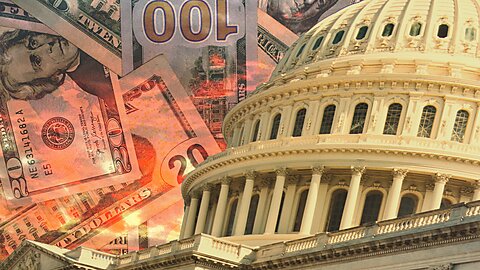Romina Boccia and Dominik Lett
Congress recently approved a $95 billion foreign aid package to send aid to Ukraine, Israel, and the Indo‐Pacific region. Including this new “one‐time” emergency spending in fiscal projections distorts the Congressional Budget Office (CBO) baseline. With interest rates persistently high and long‐term fiscal forecasts dire, Congress needs to budget honestly and transparently now more than ever. Congress should revise the baseline to exclude emergencies.
Emergencies Distort the Baseline
Each year, the independent, nonpartisan CBO produces a budget baseline used as the measuring stick to evaluate different fiscal policies’ short‐ and long‐term effects. CBO’s reports and cost estimates regularly influence the legislative process, confronting legislators with the tradeoffs involved in budgetary decisions.
One flaw of the baseline—comprised of projections of future spending and revenues—is counting temporary emergency funds alongside regular discretionary appropriations. When estimating future discretionary spending, CBO assumes both regular and emergency appropriations grow side‐by‐side each year with inflation. Due to this practice, continuing discretionary spending at the previous year’s level would counterintuitively appear as a deficit reduction relative to the budget baseline.
The picture is further muddled by the differing treatments of discretionary spending, mandatory spending, and revenues. When CBO scores individual bills, discretionary costs are estimated in relation to current law. Meanwhile, the costs of mandatory spending and revenue changes are estimated using the baseline.
Regardless, CBO’s budget baseline directly impacts congressional scorekeeping. When Congress produces its budget resolution—the overall framework within which Congress considers legislative bills that affect spending and revenues—it relies heavily on CBO’s baseline. Artificially boosting projected spending by including emergencies alongside regular appropriations has meaningful downstream effects on congressional fiscal decisionmaking.
Treating temporary emergency provisions as permanent and growing expenditures creates an insidious ratcheting effect, baking in a bias toward higher spending. Spending‐prone legislators can point to the artificially elevated baseline to justify further spending increases. Moreover, it undermines the original purpose of emergency spending—a budgetary safety valve for necessary, sudden, urgent, unforeseen, and nonpermanent situations.
The latest foreign aid package illustrates just how broken the emergency spending process is. Not only will it add $95 billion to the deficit and bypass spending limits, but it will also add $40 billion in interest costs over the next 10 years. In total, the fiscal cost of Ukraine aid could top $240 billion. Adding insult to injury, Congress mandates that CBO distort the baseline by treating this funding as a permanent, growing expenditure in the baseline despite the vast majority of new supplemental budget authority only being provided for fiscal year 2024.
Congressional desensitization to emergency deficit spending is a major reason why emergency spending over the last three decades ballooned to $14 trillion (including interest) and why the public debt is sitting at a record $27 trillion. And that’s before considering the pernicious long‐term effects of building in an expectation for higher spending based on temporary emergency provisions billed as one‐time costs.
Sensible Fiscal Reforms
The Stop the Baseline Bloat Act (H.R.8068), recently introduced by Reps. Glenn Grothman (R‑WI) and Ed Case (D‑HI), strikes emergency spending from the budget baseline. This change would make CBO’s baseline less biased toward higher spending. Congressional practice of relying on emergency appropriations to fund ongoing issues poses a significant challenge to fiscal responsibility and undermines the integrity of the budget process. Emergency appropriations are intended for unforeseen and urgent circumstances, not as a stopgap for chronic budgetary shortfalls or to circumvent the regular appropriations process. Additionally, if Congress is intent on relying on emergency spending on a regular basis, CBO should provide an alternate estimate of budget projections that includes emergency spending. Read our “Six Reforms to Enhance Transparency and Fiscal Accountability through the Congressional Budget Office” blog for other CBO reforms that would enhance transparency and accountability in the budget process.
The United States cannot afford to continue recklessly high levels of deficit spending given our current fiscal trajectory. A baseline change that accurately reflects the nature of emergency spending is a critical step in this direction. Curbing this and other abuses of emergency spending should be a bipartisan priority.

